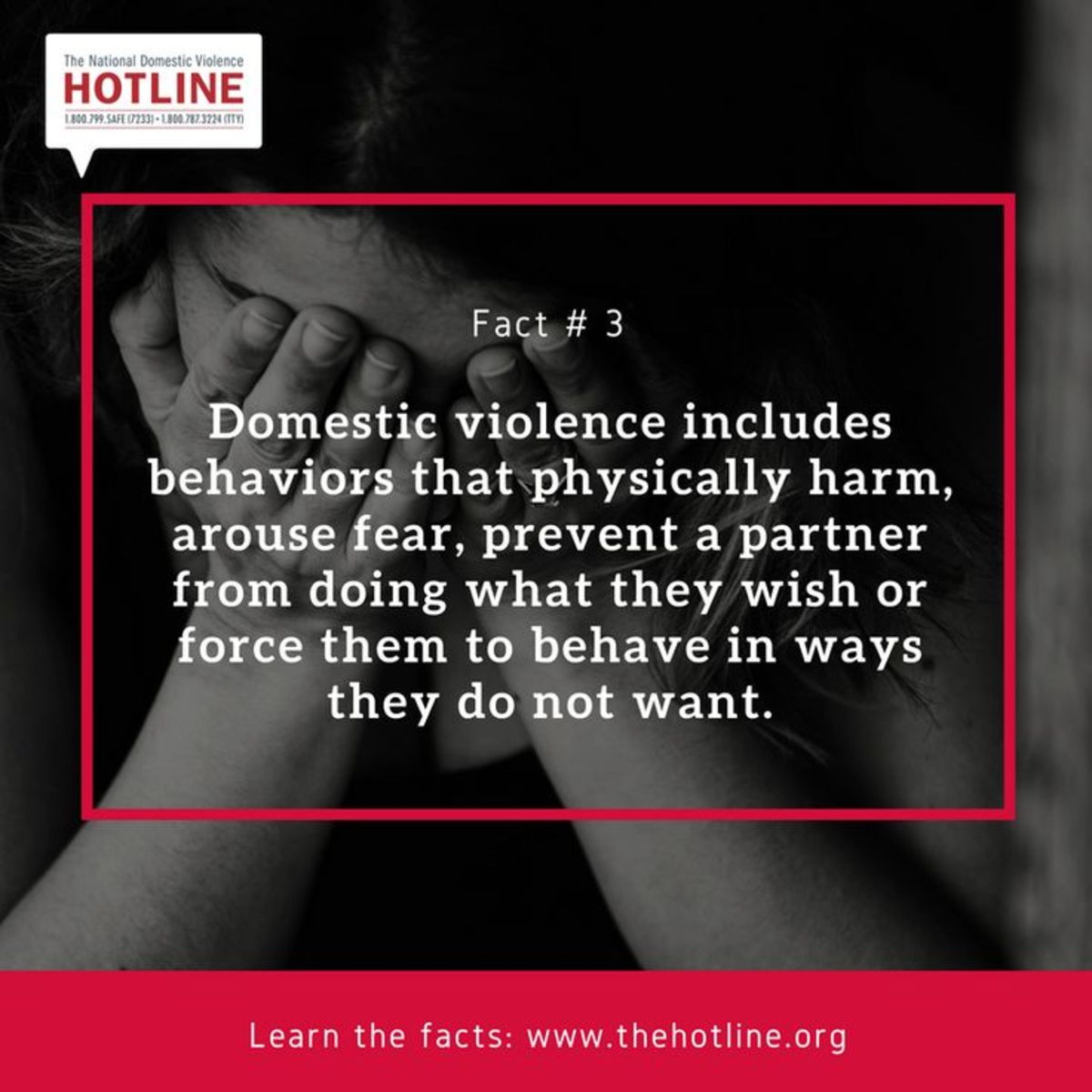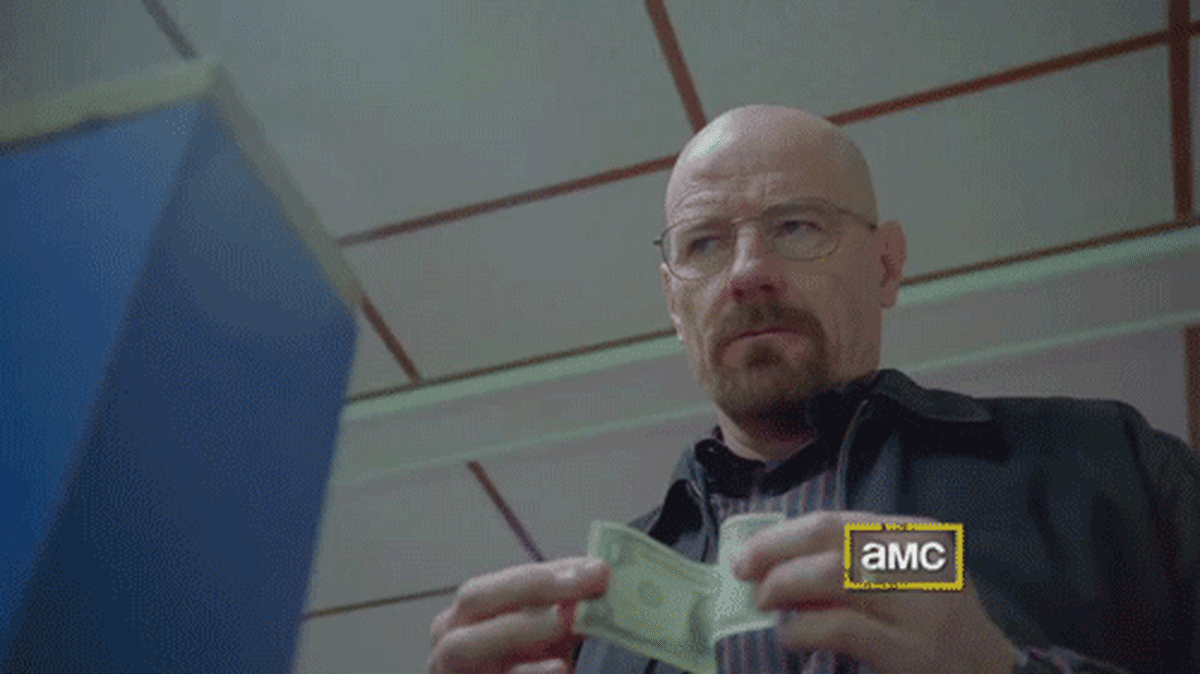Writers Rejection: Part of Becoming a Writer
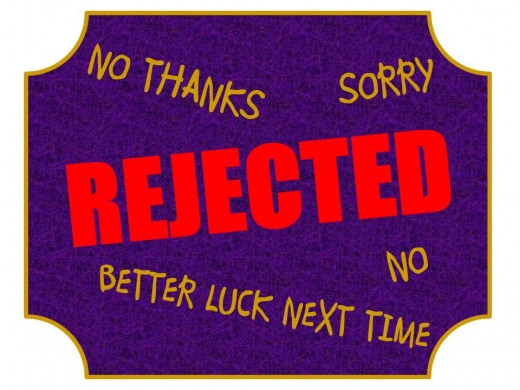
The worst enemy to creativity is self-doubt.
Author Sylvia Plath
Rejection is Part of the Writing Process
Yeah yeah yeah “rejection and writing go hand in hand” so we’re told. But that doesn’t mean it stings any less.
Let’s face it, rejection letters hurt. They leave a throbbing ache that can be difficult to overcome.

Becoming a Writer: Why Do We Write?
Most writers have a burning passion that comes from deep within to be creative with our written words and share them with others. We have a story to tell.
It is important for us to have our voices heard. We thrive on the hope that our thoughts are meaningful and touch readers in a special way. And earning an income writing makes it all the better.

Reasons for Rejecting a Writer’s Work
First of all, let’s remind ourselves that there are many publishers out there that continue to kick themselves in the a** after rejecting work that went on to be a huge success.
- A publisher may reject your work for reasons that have nothing to do with the quality of your writing. It’s possible that your writing submission simply does not fit well with their particular market.
- Maybe you sent a spontaneous manuscript and you didn’t read the fine print in their submission guidelines stating “unsolicited manuscripts will be returned.”
- If a publisher is hoping for a piece that is 1,000 words in length and you present content that is over 3,500 words, your writing may be superb yet it doesn’t fit with the current needs.
- A publisher simply may not be able to identify a market for your work.
- They may also feel that your writing would fit better elsewhere and be kind enough to give you that advice.
- It could be that the timing of your submission isn’t good because the budget has run out and there are no funds to purchase your work. The publisher may not even read your work in this case, and the rejection has nothing to do with you personally.
- What if the publication is always written in third person and you wrote your piece in first person? Rejected!

Rejection Can Be Very Impersonal
- Some rejection may come in the form of a nicely written letter giving you advice, wishing you the best with a handwritten signature.
- The rejection could be an obvious form letter, the same one sent to every “rejectee.”
- It could also be as simple as a big red REJECTED stamp that makes you feel as if it was posted on your forehead for the entire world to see.
Whether or not a publisher loves or hates your work is very subjective, caused by a variety of influences that can simply come down to personal taste. Of course, there is the possibility that our writing really is crappy. But that’s okay too. Every rejection is an opportunity to continue to learn and sharpen our skills.

Flashback’s of My “Rejection Story”
I wrote for many years simply “letting it out” ~ never searching for nor wanting feedback or approval from others. Back when I was still in grade school and into my 20’s, I wrote poems and stories that were a release for me personally. I would quietly put them away in a three-ring binder never to be seen by anyone except my mother on occasion.
Beginning in my late 20’s, I finally decided it was time to share my writing passion with others. Of course, I also wanted to make some money too. I purchased my first hard copy of the Writer’s Market. I read and read with excitement learning about all the avenues for writers to get their work published.
I decided I would start with writing magazine articles and hopefully see my name in print. Dreams of becoming rich and famous often invaded my sleep.
I wrote my first article titled “Have Things Really Changed.” And then another and another. I quickly learned about SASE’s, publishing rights and proper manuscript format. I worked long and hard on my query letters. I chose the magazines where I wanted to try to publish my work.
I made the mistake of thinking that my writing was good enough to go straight for the popular magazines. I submitted my work to places like Woman’s Day, Good Housekeeping, Parenting and Reader’s Digest.
Here are a couple examples of how that turned out for me.
1996 Rejection Letter from Good Housekeeping
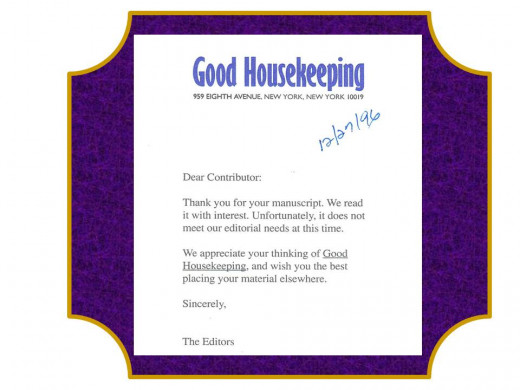
1997 Rejection Letter from Reader's Digest
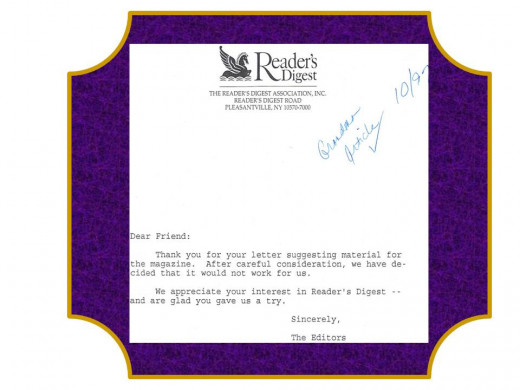
The Need to Refocus
I quickly learned that I was nobody in comparison to the infinite number of people who wish to be a published author. The rejections hurt as they continued to pile up on my desk.
I decided to shift gears and try to write for a local audience; something I should have done to begin with. I contacted the local editor at The City Visitor, a free magazine mainly distributed to hotels. He was kind enough to set up an in-person meeting with me.
By the time I left the meeting, I had secured two separate article contracts. I was thrilled and worked extremely hard on these articles which included some traveling for which I was reimbursed. They liked my work and once the articles were in print, I received two separate checks for $400 each plus expenses. I couldn’t have been happier.
Fast Forward Many Years
I did not continue my writing on a regular basis due to the fact that I had a great full-time job. I would write when I felt like it but put no pressure on myself. I rarely tried to have anything published, and when I did, I would add another rejection letter to the pile.
It wasn’t until more recently that I began writing again when I joined HubPages in early 2011. HubPages has allowed me to publish my own work, learn, receive feedback and continue to gain confidence.
Of course, there is much more I could share related to my passion for writing. My hope is that others will understand that rejection is likely and even necessary to motivate us to keep writing.

Is Getting Something Published a True Measure of Success?
Yes, of course, it certainly seems that way. And in the majority of cases, it is true. A writer has something published; that equals success.
The reality is that there are some extremely substandard, published writers. We’ve all seen it. That bad writing with horrible grammar, spelling mistakes and text that makes no sense. The kind that leaves us scratching our head in utter amazement and cringing as we abruptly stop ourselves from reading even one more word.
So how did the poor writing make it through the gates? Did the writer pay someone off to secretly distribute their work? Are they the great niece of the CEO? Do they just so happen to be the "dog whisperer" for one of the editors at Random House?
WHO KNOWS?
Seriously, it - does - not - matter!

Are You a Writer?
Which statement bests fits how you feel about rejection?
What Really Matters
First and foremost, do not be afraid of rejection. We could just write to our hearts content and then file it away in a folder, never to see the light of day again. But how would we ever get anything published if we don’t at least try.
Use any rejection that you may receive as a positive opportunity. If you truly believe in your writing, work through any negative responses. Remember that the most famous writers all received rejection at some point in their careers.
Stay motivated. Keep learning. Keep writing. Keep submitting. And be proud of your effort as a writer.
This is Sharyn’s Slant

Interested In Writing For HubPages?
Go to the SIGN IN PAGE to get started now!
Want To Follow Sharyn's Slant On HubPages
Please click HERE TO GO TO THE PROFILE PAGE. Then click on FOLLOW next to the profile picture.








